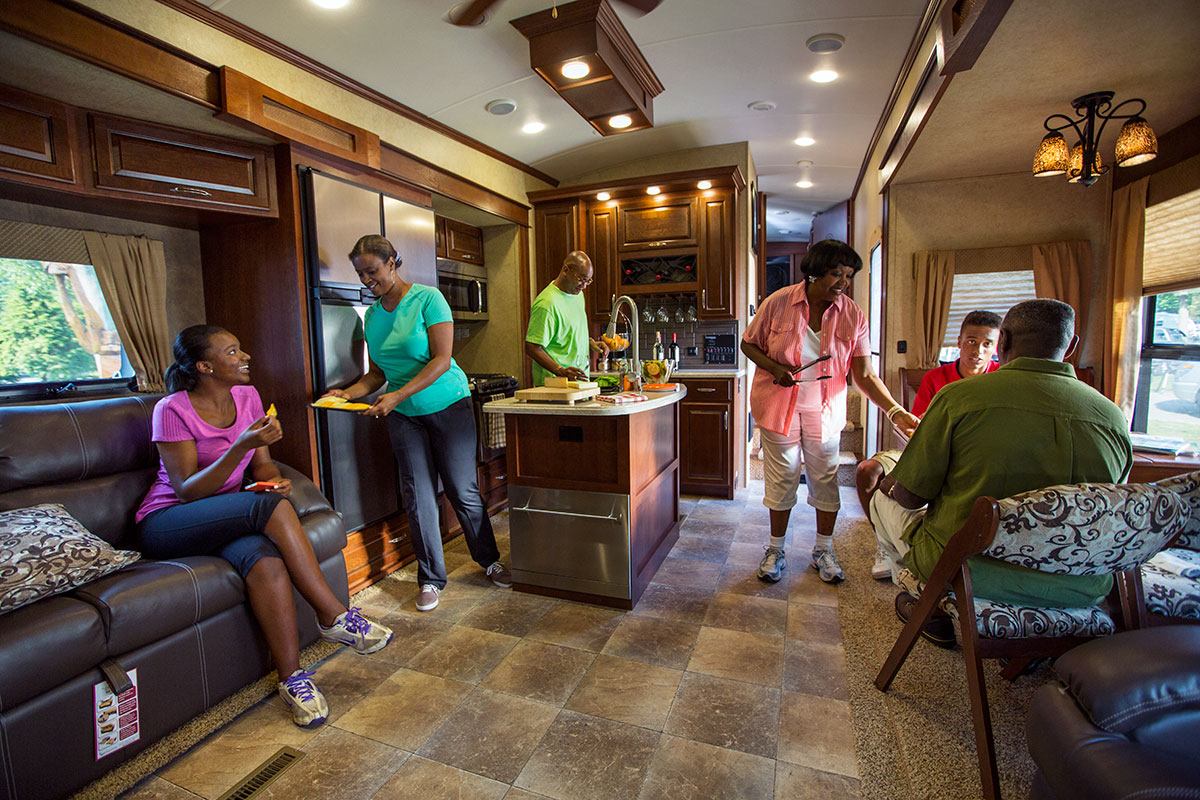A popular choice of RV is the well-known fifth-wheel travel trailer. It has some of the most diverse layouts and practical storage than other types of towable RVs. If you are considering purchasing and owning a fifth-wheel, it’s important to know the pros and cons.
Pros
You can easily distinguish a fifth-wheel travel trailer by its in-box hitch called a fifth-wheel coupling – and that’s one of the pros of this type of RV. Compared to other RVs, this design is intended to – and does – increase safety while towing, including reducing sway and facilitating better weight distribution on the tow vehicle. Second, you’re able to pull a larger load because of how the weight hangs over the truck bed.
When it comes to space and options, you can’t beat a fifth-wheel. There can be as many as four slideouts, even up to three feet. The living quarters can be quite elegant and spacious and include sleeping areas, showering, dining, cooking, and entertainment. The longer the unit, the more features it’ll have (which is a con, too, because longer units are more difficult to tow). Fifth-wheels can come with a long list of luxuries such as inbuilt USB ports, pre-wired for solar, and an enclosed undercarriage.
Since it’s a towable RV, you can easily detach a fifth-wheel from the tow vehicle and use the tow vehicle to do any off-site errands or sightseeing, which is much easier than navigating a large RV around. There are even some lightweight models available now that are half-ton towable and thus better designed for smaller trucks.
Fifth-wheel travel trailers are heavy, but they are also very durable.
Cons
Fifth-wheels can come with a hefty price tag (up to $160,000 for a new model), not to mention the price of a heavy-duty truck that’s powerful enough to tow the trailer if you don’t already have one with that capability. Because of the fifth-wheel’s length, 21-40 feet, and height, there can be restrictions as to where you can camp, including state and national park campgrounds. If exploring our nation’s parks is a big reason for getting an RV in the first place, then another type of RV may be a better fit for fulfilling that goal.
Low bridges and low branches can be problematic for fifth-wheels, so it’s important to plan your route to avoid low underpasses and bridges, and to include a saw on your packing list in case a branch or two needs to be trimmed during your trip. Again, due to this RV’s size, gas mileage can be particularly low – perhaps even single digits.
The slideouts do offer a lot of space, but the configuration can at times make the fifth-wheel cumbersome to use if they are not pulled out.
Before you buy…
You need to assess your lifestyle, amenities wish list, and how you intent to use the RV for camping and traveling. When you check out units, take a look at the layout and how the traffic would generally flow. Our articles about whether or not to own an RV and choosing the best travel trailer can help you with that decision-making process so that you pick the best fifth-wheel – or RV – for you.

